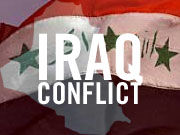Photos
Your Voice
| ||||||||||||||||||||||||
Increasing talk of war has Minnesota on edge
March 19, 2003
 |
| In Minneapolis on Wednesday afternoon, police closed the Third Avenue bridge over the Mississippi River after finding a potential security breach Wednesday. (MPR Photo/Mark Zdechlik) |
Minneapolis, Minn. — In Minneapolis on Wednesday afternoon, police closed the Third Avenue bridge over the Mississippi River after finding a potential security breach Wednesday.
Authorities discovered a lock at a power plant under that bridge had been tampered with, allowing access to a honeycomb of old tunnels near the bridge. Officers also found tools in the area. But there was no immediate indication of a bigger problem, police said.
 | |||
Police Chief Robert Olson said officers decided to use "an abundance of caution" under the circumstances. The bridge was reopened at mid-afternoon.
Meanwhile, random vehicle searches resumed at the state's largest airport. "We're mainly just looking at cargo holds, the back seats of cars, and the cargo space of vans or trucks," said Metropolitan Airports Commission spokesman Patrick Hogan. "We're looking for large explosives. We're not looking in people's glove compartments or anything invasive." Airports around the country began similar inspections.
Gov. Tim Pawlenty ordered National Guard troops to report for duty Wednesday morning to guard nuclear facilities. He activated teams of specially trained state troopers to take up positions near two nuclear power plants and two refineries.
Coordination was increased among federal officials guarding Minnesota's border with Canada and the Duluth port. State agriculture inspectors went on call around the clock to respond to emergencies in the food supply.
Security at the Metrodome for the NCAA men's basketball tournament Midwest regional games will be akin to security during football, said Bill Lester, executive director of the Metropolitan Sports Facilities Commission. The regional semifinals are scheduled for March 27, and the championship game is planned for March 29.
"The threat of war did not provoke any new procedures other than those we had implemented since September 11th," Lester said. Those include a ban on carrying coolers or containers into the Dome, checks of bags carried by fans. The NCAA said Tuesday the games will be played even if a war starts.
The boy's state high school basketball tournament also will go on at Target Center and Williams Arena this weekend even if war breaks out.
With no known threats against the tournament or its venues and with continued vigilant security, Minnesota State High School League executive director Dave Stead said it would be best for those involved in the tournament to continue play.
The state and Hennepin County prepared their Emergency Operations Centers, which they use to coordinate police, fire, and medical responses. The FBI readied its command center. All three were expected to be activated once a war begins.
"We're better positioned today to thwart a terrorist attack than at any point in our history," said FBI Agent Paul McCabe.
War opponents made plans, too. The University of Minnesota Coalition against War in Iraq is organizing student walkouts at 23 colleges and high schools once shooting starts.
Gov. Pawlenty says the state is ready for possible anti-war demonstrations.
"We will be respectful of their rights to protest, to demonstrate to voice their concerns that's absolutely appropriate," Pawlenty said. "We just need to make sure that it's done in a lawful manner. I mean if people are engaged in breaking the law then we're going to have to address it and we're prepared to do that and there have been plans in place and there are plans in place to deal with it if it comes to that."
Student organizations and peace groups have said they plan to hold public demonstrations soon after any hostilities against Iraq begin.
Several people said they don't consider Minnesota to be any less of a target than New York or Washington.
"If we don't (prepare), and we let down our guard, maybe something will happen - even here in Minnesota. ... Their strategy seems to be that they hit you when you don't expect," said Loren Vaughn, a 27-year-old student who lives in Minneapolis.
"What they would like to do is cause as much panic and fear as they can - anywhere in the United States," said University of Minnesota student Keith McDermid, 33.
Some saw the threat of retaliation as no reason to leave Saddam Hussein in power.
"It is a worry, but I don't think it should be a reason to stop you from removing an evil man who will perpetuate this type of conflict," said Mike Bartusch, a 17-year-old junior at Eastview High School in Apple Valley.
|
News Headlines
|
Related Subjects
|

